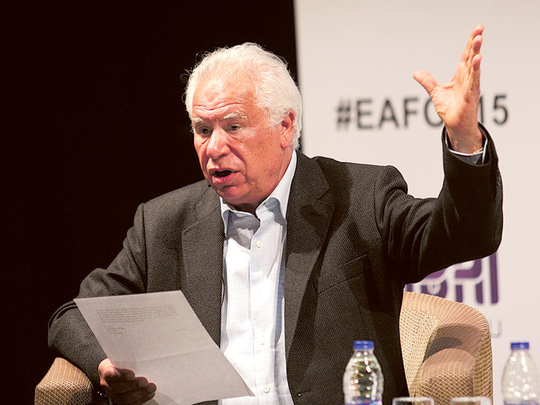
Dubai: Palestinian poet Mourid Barghouti is sceptical of every lexical definition of the word ‘place.’ Thirty years of exile, he said, had left him with a feeling of displacement.
Born in 1944, Barghouti has published 12 books of poetry to date. The most recent — Midnight and Other Poems — was translated into English by his late wife Radwa Ashour.
His autobiographical narrative, I saw Ramallah, won the Naguib Mahfouz Award for Literature in 1997. Palestinian-American literary theorist Edward Said called the book: “one of the finest existential accounts of Palestinian displacement we now have.”
Barghouti says displacement from his homeland was a vital inspiration to his writing.
“It took me a lifetime to understand the word place,” he said, speaking at the Intercontinental Hotel on Wednesday at the Emirates Airlines Festival of Literature.
“One needs to think of place as a time, as history, as a concept. The Berlin Wall and Israeli Wall are not just sites, they are concepts. A concept of the space we have to freely be in. Prisons and horizons are only as valuable as the feelings they arouse in us,” he said before concluding with some of his writing: ‘Blessed be the birds in their cages, for at least they know the limit of their freedom’.
According to Barghouti said all writers write about just two things.
“People think my writing has some political nature to it. However, all writers write about just two things: life and death. If death comes as a result of oppression or tyranny or coercion. It becomes political.”
When asked what made him decide to become a poet, Barghouti said: “I wanted to sustain my capability to practice criticism. In poetry you have the capability to criticise the self, a nation, a people, your work, your boss, your leader ...”
Barghouti said he doesn’t measure life between right and wrong, virtue and sin. “To me, the criteria is simply between beauty and ugliness. I distance myself from ugliness. I simply cannot bear it. I cannot live with ugliness. To me, life isn’t measured by what is right or wrong, but by beauty and ugliness.”
Barghouti said one has to leave the past where it belongs — in the past. “The times of the past are seen as through a corridor. The past isn’t a dream, we shouldn’t cling to it. Leave the past in the past and if your past had elements more favourable than the present, then find ways to reintroduce them to the future. Yesterday is of no value, today is being lived for tomorrow.”
Criticising writers for using verbose and ornamental language, Barghouti said: “Writers must be wary of how they are using adjectives and words in general. I, myself, try to use cool language, make it accessible to the layman. Writers must approach language with the precision and accuracy of a surgeon.”







